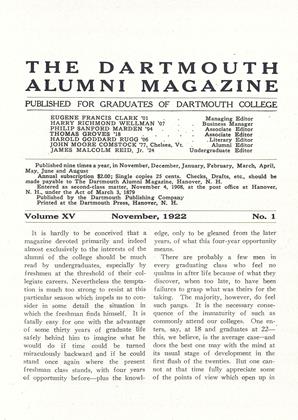"Nutrition and Growth in Children" by William R. P. Emerson, A.8., M.D. '92, Professor of Pediatrics, Tufts Medical School. D. Appleton and Company. 1922.
As a physician in charge of a Children's Out-Patient Clinic, and as professor of Pediatrics, Dr. Emerson has worked many years on the problem of the under-nourished child. In 1908 he established in Boston what "so far as I know, was the first nutrition class ever organized." Since that date he has been more and more closely associated with the problem of malnutrition, especially in children, and he has conducted nutrition classes, clinics, and institutes (to train nutrition workers) in such places as New York City, Atlanta, Chicago, Rochester, Grand Rapids, and Manchester. He has formed a national organization, Nutrition Clinics for Delicate Children, Incorporated; and his services have been in demand throughout the country.
As a result of this experience, and in the desire of bringing the subject into a more general knowledge, Dr. Emerson has written this book. Although a technical subject in a sense, the book is in no way written solely for specialists. Dealing, as it does, with the daily life of children in the home and school, it appeals to every parent, every teacher, and every person concerned with the welfare of children, and it is so presented that it is clear and interesting, and of practical suggestive value to any of these individuals. To those interested in Dartmouth this book will also appeal, for the reason that steps have already been taken to give special attention, along the lines laid down by Dr. Emerson, to those students who are found at entrance to be underweight.
Dr. Emerson points out that one-third of the children of this country are underweight and malnourished; that these cases are found at least as frequently in the homes of the well-to-do as of the poor, that such a condition is a sign of some physical defect or of improper care, that it is likely to lead to definite sickness, more or less permanent ill health, inefficiency in school or in the earning of a livelihood, and that it can almost always be cured without great difficulty.
The book deals in the first of its three main divisions with what underweight and malnutrition are, and how malnutrition is best determined. The second part contains the most valuable information to the general reader in its statements in regard to the ill effects upon the child of certain home conditions—only too common, because not realized by the parents —such as parental selfishness and irregular and faulty control of the child, carelessness in the planning for the diet and in the mode of eating, lack of supervision of the play-time, allowing too little exercise outdoors, or too much, with over-fatigue, and other home matters pertaining to the formation of rational habits of health. The third portion takes up the details of the organization and conduct of nutrition classes in the school, institution, outdoor camp, and community, with instances of its success in all of these fields.
A valuable appendix gives tables of average weight for a given height and age of the child, as well as forms for record-taking in nutrition classes. In the body of the book Dr. Emerson gives in convenient form an analysis of the "fuel" value of all the common forms of food with their proportion of protein, fat, and starchy elements.
The fact that malnutrition is so wide-spread and so catholic in its choice of home and environment is probably astounding to most of us, but the truth of the statement is unassailable. Malnutrition, as shown by the underweight of the child, is not so much a disease in itself, but it is a sign plain, to all who will read it, that all is not well with the child. The relatively easy means for determining its existence and for remedying the evil makes this book one of the greatest importance, and leaves the reader with the feeling that intelligent attention and action by this generation would lead to such results in the lives of the next generation that they would indeed rise up and call us blessed.
 View Full Issue
View Full Issue
More From This Issue
-
 Article
ArticlePRESIDENT'S ADDRESS EVOKES NATION-WIDE COMMENT
November 1922 -
 Article
ArticleAN ARISTOCRACY OF BRAINS
November 1922 By ERNEST MARTIN HOPKINS -
 Article
ArticleIt is hardly to be conceived that a magazine devoted primarily
November 1922 -
 Class Notes
Class NotesCLASS OF 1911
November 1922 By Nathaniel G. Burleigh -
 Class Notes
Class NotesCLASS OF 1911
November 1922 By Nathaniel G. Burleigh -
 Article
ArticleTHE CLASS OF 1926
November 1922 By E. GORDON BILL
Books
-
 Books
BooksGreat Companions.
NOVEMBER 1927 By Charles D. Adams -
 Books
BooksAN HERB BASKET,
March 1951 By F. CUDWORTH FLINT -
 Books
BooksSCHOOLS FOR STRATEGY: EDUCATION AND RESEARCH IN NATIONAL SECURITY AFFAIRS.
JANUARY 1966 By HOWARD WRIGGINS '40 -
 Books
BooksTHE CURVE OF SOCIETAL MOVEMENT
AUGUST 1930 By J. W. Young -
 Books
BooksHOW TO ADOPT A CHILD.
JULY 1967 By MICHAEL L. SLIVE '62 -
 Books
BooksMENTION MY NAME IN HAWAII!!!!
November 1973 By ROBERT O. WHITE'54


